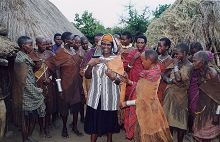According to Wynfred Russell: “the end of the Cold War created a vacuum in Western strategic interest in Africa […] into this vacuum rushed humanitarianism and its twin, liberal human rights, as alternative guiding lights for Euro-American foreign policy.”
Russell, the director at the Center for Multicultural Services at Normandale Community College gave a presentation at the Africa Today Conference to explain why Minnesota is particularly attractive to refugees.
African immigrants in Minnesota leave their countries of birth for a myriad of reasons including: “civil war, ethnic/religious violence, human rights violations, poverty and economic depravity, political repression, educational advancement and economic opportunities. “
Russell attributes the large settlement of refugees to the presence of ten refugee humanitarian organizations in Minnesota who settle refugees here through the American Refugee Resettlement Program. (See diagram for the largest of these humanitarian organizations) These organizations he asserts are aggressive in resettling refugees in Minnesota: “they ambulance chase refugees.”
The cycle, he says, continues because these organizations need to continue receive funding to stay in business so they settle refugees in Minnesota so that they (the organizations) can offer services, such as trauma therapy, cultural adjustment among other social services to these new Americans.
Russell observed that “unfortunately, many people make money in the name of helping poor people.” He also said that not all humanitarian organizations and people were out to make money out of refugees.
Once refugees are settled through the American Refugee Resettlement Program, they bring in their families and soon a thriving community begins to establish itself; another reason explaining the large number of refugees in Minnesota.
Following his presentation, the audience engaged in a lively debate on the fate and success of refugee settlement. Most notably was the frustration of many refugees expressing the challenges of accessing the professional job market.
Russell agreed, “Underemployment is a serious problem in Minnesota among Africans. My maternal uncle was an engineer in Liberia, he now works as a janitor at HCMC. His Liberian educational credentials are not recognized.”
A social worker in the audience attempted to address the underemployment issue: food processing, and textile industry have been instrumental in hiring refugees. As for professionals, many of these refugees have lost all paper trail on their education, and professional background, and it is impossible for them to get professional jobs.”
An elderly American man also said that with a failing economy it is harder for older individuals, foreign or not, to get jobs matching their qualifications.
Many immigrants “take the first job that comes to them because they need to sustain their families.”
About Julia N. Opoti
A former Mshale editor, Julia Nekessa Opoti is now the producer and host of the radio show: Reflections of New Minnesotans on AM950 . She also edits/publishes Kenya Imagine.







